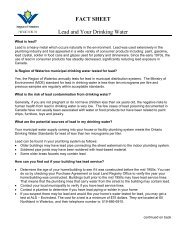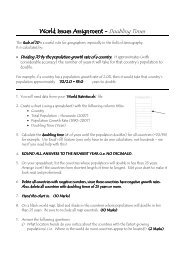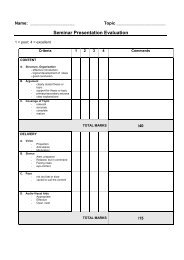Non-Governmental Organizations (NGOs)
Non-Governmental Organizations (NGOs)
Non-Governmental Organizations (NGOs)
You also want an ePaper? Increase the reach of your titles
YUMPU automatically turns print PDFs into web optimized ePapers that Google loves.
<strong>Non</strong>-<strong>Governmental</strong><br />
<strong>Organizations</strong> (<strong>NGOs</strong>)
Background<br />
Background<br />
• <strong>NGOs</strong> have become major players in the<br />
field of international development. From<br />
1970 to 1985 total development aid<br />
disbursed by international <strong>NGOs</strong> increased<br />
ten-fold.<br />
• It is now estimated that over 15 percent of<br />
total total overseas overseas development development aid aid is<br />
channeled through <strong>NGOs</strong>.
Definition<br />
Definition<br />
• The World Bank defines <strong>NGOs</strong> <strong>NGOs</strong> <strong>NGOs</strong> <strong>NGOs</strong> as "private private<br />
organizations organizations that that pursue pursue pursue activities activities<br />
activities<br />
– to relieve suffering<br />
– promote the interests of of the poor<br />
– protect protect the environment<br />
– provide basic social services<br />
– undertake undertake community development
• <strong>NGOs</strong> are typically value-based organizations<br />
that depend, in whole or in part, on charitable<br />
donations and voluntary service.<br />
• Although the NGO sector has become<br />
increasingly professionalized over the last two<br />
decades, principles of altruism altruism altruism altruism (the the practice practice of<br />
of<br />
placing placing placing others others before before one one’s one s self self) self<br />
and voluntarism<br />
still play a key role in the organizations.
NGO NGO Types Types<br />
Types<br />
• classified according to whether they are:<br />
– more relief or development-oriented<br />
– whether they are religious or secular<br />
– whether they stress service delivery or<br />
participation<br />
– whether they are more public or privateoriented.
NGO NGO Strengths Strengths Strengths and and and Weaknesses<br />
Weaknesses<br />
• Some specific strengths generally<br />
associated with the NGO sector include<br />
the following:
• strong grassroots links<br />
• field-based development expertise<br />
• the ability to innovate and adapt<br />
• process-oriented approach<br />
• Helping through doing<br />
• long-term commitment and emphasis on<br />
sustainability<br />
• cost-effectiveness
The most commonly identified weaknesses of the<br />
sector include:<br />
• limited financial and management expertise<br />
• low levels of self-sustainability<br />
• isolation/lack of inter-organizational<br />
communication and/or coordination<br />
• small scale interventions<br />
• lack of understanding of the broader social or<br />
economic context
Case Case Study Study<br />
Study<br />
World World Accord<br />
Accord<br />
Waterloo, Waterloo, ON<br />
ON
Goals<br />
Goals<br />
• Focus on development<br />
development development<br />
development – helping people build<br />
up their capacity to improve their own lives over<br />
the long term<br />
• Work through partners and grassroots<br />
community groups to create education, training<br />
and self-help programs for the poor<br />
• Placing decision making and implementation<br />
responsibility in local hands helps to ensure<br />
programs become self-sustaining
Stoves like this<br />
Lorena stove are<br />
much better in<br />
homes than<br />
traditional open pit<br />
fires. They use 40%<br />
less wood and are<br />
much healthier<br />
because they vent<br />
soot and smoke to<br />
the outside.
World Accord Projects<br />
• Central America – El Salvador, Honduras, Honduras Honduras Honduras<br />
Guatemala<br />
• Asia Asia – India, Nepal, Philippines, Sri Lanka,<br />
Pakistan<br />
• Africa Africa Africa - Malawi
Case Case Study<br />
Study<br />
Programma Programma de Reconstrucci<br />
Reconstrucción Reconstrucci<br />
Rural<br />
(The Rural Reonstruction Progarm)<br />
Honduras, CA
PRR PRR’s PRR Goal Goal<br />
• "To promote integrated participatory<br />
development with the people in the rural<br />
Honduran communities where Programa<br />
de Reconstrucción Rural works.<br />
• To achieve a higher standard of living with<br />
human dignity, while conserving the<br />
natural environment for future<br />
generations."
PRR PRR<br />
PRR<br />
• PRR doesn’t march into a community and<br />
tell them what they need. They will only<br />
assist if they are approached by the<br />
community.<br />
• If a community agrees, they must strive to<br />
develop their community in the following<br />
ways:
1. Increase organization within the<br />
community<br />
2. Increase health<br />
3. Improve the economy<br />
4. Improve education
Pig Project – 1 boar, 6 sows; 6 months till piglets are full<br />
grown (micro-credit loans)
Grain silos help prevent rats and mice from destroying 50% of<br />
families’ crops.

















